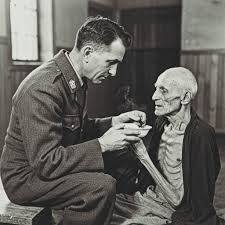When U.S. troops liberated Dachau in April 1945, they entered a world of suffering and starvation so severe that words could hardly capture its depth. Among the survivors was a man so weak he couldn’t lift a spoon to his mouth.
One American soldier knelt beside him, gently lifting broth to his lips. “Don’t give up,” he said softly, “I’ll help you eat.” For the prisoner, that moment was more than just nourishment. It was the first time in years someone treated him not as a number, but as a human being—a brother.
Survivors of Dachau carried memories like this with them for the rest of their lives. They spoke often of how a simple act of compassion—food given slowly, words spoken gently—meant just as much as the liberation itself.
This moment reminds us: history is not only written in great speeches or battles but also in the quiet acts of humanity where one person chooses compassion in the face of cruelty